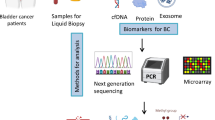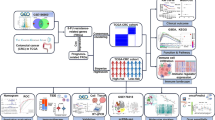Abstract
Purpose
To determine the presence of a group of mutations, and establish the prognostic value for recurrence and progression.
Materials and methods
Prospective observational study. Intermediate-to-high-risk non-muscle invasive bladder cancer (NMIBC) was evaluated. Data from genetic analyses were included in a database along with clinicopathological variables of interest.
Results
Seventy-four patients. Twenty-five (33.8%) recurred and 3 (4.1%) progressed. Median time to recurrence: 8 months (5.7–12.7). Median time to progression: 14 months (P75: 12). Mutation distribution: KRAS codon 12: one patient (1.4%), BAT25: five patients (6.8%), BAT-26: four patients (5.4%), and D2S123: 6 patients (8.1%). Arg72Pro polymorphism: 50 patients (67.6%) exhibited homozygous mutations, 23 (31.1%) were heterozygous, and 1 patient (1.4%) did not present the mutation. We found an association between presence of MSI at BAT26 and female sex (p < 0.05) and tumor stage and the TP53 Arg72Pro polymorphism. Recurrence-free survival (RFS) was significantly associated with presence of MSI at D2S123, with a HR of 5.44 for patients presenting the mutation (95% CI 1.83–16.16). On multivariate analysis, we found a statistically significant increase in risk of recurrence among patients with MSI at D2S123 (HR 5.15; p < 0.05) and more than 2 previous transurethral bladder resections (TURBs) (HR 5.07; p < 0.05) adjusted for tumor stage and grade. Harrell’s concordance index revealed an accuracy of 0.74 (p < 0.05).
Conclusion
An association was found between presence BAT26 MSI and female sex, Arg72Pro polymorphism with tumor stage and D2S123 and more than 2 TUR procedures were associated with RFS adjusted to tumor stage and grade.

Similar content being viewed by others
References
Cancer of the Urinary Bladder—SEER Stat Fact Sheets [Internet]. Disponible en: https://seer.cancer.gov/statfacts/html/urinb.html. Accessed 5 de noviembre de 2016.
Cambier S, Sylvester RJ, Collette L, Gontero P, Brausi MA, van Andel G, et al. EORTC Nomograms and Risk Groups for Predicting Recurrence, Progression, and disease-specific and overall survival in non-muscle-invasive stage Ta-T1 urothelial bladder cancer patients treated with 1–3 years of maintenance Bacillus Calmette-Guérin. Eur Urol. 2016;69(1):60–9.
Soulières D, Greer W, Magliocco AM, Huntsman D, Young S, Tsao M-S, et al. KRAS mutation testing in the treatment of metastatic colorectal cancer with anti-EGFR therapies. Curr Oncol. 2010;17(Suppl 1):S31–40.
Jiricny J. Mediating mismatch repair. Nat Genet. 2000;24(1):6–8.
Slee EA, O’Connor DJ, Lu X. To die or not to die: how does p53 decide? Oncogene. 2004;23(16):2809–18.
Hollstein M, Rice K, Greenblatt MS, Soussi T, Fuchs R, Sørlie T, et al. Database of p53 gene somatic mutations in human tumors and cell lines. Nucleic Acids Res. 1994;22(17):3551–5.
Pandith AA, Shah ZA, Khan NP, Rasool R, Afroze D, Yousuf A, et al. Role of TP53 Arg72Pro polymorphism in urinary bladder cancer predisposition and predictive impact of proline related genotype in advanced tumors in an ethnic Kashmiri population. Cancer Genet Cytogenet. 2010;203(2):263–8.
Schrier BP, Vriesema JLJ, Witjes JA, Kiemeney LALM, Schalken JA. The predictive value of p53, p27(kip1), and alpha-catenin for progression in superficial bladder carcinoma. Eur Urol. 2006;50(1):76–82.
Wright M, Beaty JS, Ternent CA. Molecular Markers for Colorectal Cancer. Surg Clin North Am. 2017;97(3):683–701.
Catto JWF, Azzouzi A-R, Amira N, Rehman I, Feeley KM, Cross SS, et al. Distinct patterns of microsatellite instability are seen in tumours of the urinary tract. Oncogene. 2003;22(54):8699–706.
Mongiat-Artus P, Miquel C, van der Aa M, Buhard O, Hamelin R, Bangma C, et al. Infrequent microsatellite instability in urothelial cell carcinoma of the bladder in young patients. Eur Urol. 2006;49(4):685–90.
Watson MMC, Berg M, Søreide K. Prevalence and implications of elevated microsatellite alterations at selected tetranucleotides in cancer. Br J Cancer. 2014;111(5):823–7.
Sylvester RJ, van der Meijden APM, Oosterlinck W, Witjes JA, Bouffioux C, Denis L, et al. Predicting recurrence and progression in individual patients with stage Ta T1 bladder cancer using EORTC risk tables: a combined analysis of 2596 patients from seven EORTC trials. Eur Urol. 2006;49(3):466–5 (discussion 475–477).
Audenet F, Attalla K, Sfakianos JP. The evolution of bladder cancer genomics: what have we learned and how can we use it? Urol Oncol. 2018;36(7):313–20.
Tan WS, Rodney S, Lamb B, Feneley M, Kelly J. Management of non-muscle invasive bladder cancer: a comprehensive analysis of guidelines from the United States, Europe and Asia. Cancer Treat Rev. 2016;47:22–31.
Apollo A, Ortenzi V, Scatena C, Zavaglia K, Aretini P, Lessi F, et al. Molecular characterization of low grade and high grade bladder cancer. PLoS ONE. 2019;14(1):e0210635.
Nassar AH, Umeton R, Kim J, Lundgren K, Harshman L, Van Allen EM, et al. Mutational analysis of 472 urothelial carcinoma across grades and anatomic sites. Clin Cancer Res Off J Am Assoc Cancer Res. 2018;25(8):2458–70.
Kompier LC, Lurkin I, van der Aa MNM, van Rhijn BWG, van der Kwast TH, Zwarthoff EC. FGFR3, HRAS, KRAS, NRAS and PIK3CA mutations in bladder cancer and their potential as biomarkers for surveillance and therapy. PLoS ONE. 2010;5(11):e13821.
Ouerhani S, Bougatef K, Soltani I, Elgaaied ABA, Abbes S, Menif S. The prevalence and prognostic significance of KRAS mutation in bladder cancer, chronic myeloid leukemia and colorectal cancer. Mol Biol Rep. 2013;40(6):4109–14.
Yang Z, Nie S, Zhu H, Wu X, Jia S, Luo Y, et al. Association of p53 Arg72Pro polymorphism with bladder cancer: a meta-analysis. Gene. 2013;512(2):408–13.
de Santos LEMC, Guilhen ACT, de Andrade RA, Sumi LG, Ward LS. The role of TP53 PRO47SER and ARG72PRO single nucleotide polymorphisms in the susceptibility to bladder cancer. Urol Oncol. 2011;29(3):291–4.
Pineda S, Milne RL, Calle ML, Rothman N, de Maturana EL, Herranz J, et al. Genetic variation in the TP53 pathway and bladder cancer risk. A comprehensive analysis. PLoS ONE. 2014;9(5):e89952.
Zhang L, Wang Y, Qin Z, Li R, Cong R, Ji C, et al. TP53 codon 72 Polymorphism and bladder cancer risk: a meta-analysis and emphasis on the role of tumor or smoking status. J Cancer. 2018;9(19):3522–31.
Giedl J, Schneckenpointner R, Filbeck T, Ruemmele P, Hofstaedter F, Burger M, et al. Low frequency of HNPCC-associated microsatellite instability and aberrant MMR protein expression in early-onset bladder cancer. Am J Clin Pathol. 2014;142(5):634–9.
Catto JWF, Miah S, Owen HC, Bryant H, Myers K, Dudziec E, et al. Distinct microRNA alterations characterize high- and low-grade bladder cancer. Cancer Res. 2009;69(21):8472–81.
van der Post RS, Kiemeney LA, Ligtenberg MJL, Witjes JA, Hulsbergen-van de Kaa CA, Bodmer D, et al. Risk of urothelial bladder cancer in Lynch syndrome is increased, in particular among MSH2 mutation carriers. J Med Genet. 2010;47(7):464–70.
Author information
Authors and Affiliations
Contributions
HG-G: manuscript writing. ER-G: manuscript writing. MM-de lasC: data analysis. CF-P: data analysis. JMS: manuscript writing.
Corresponding author
Ethics declarations
Conflict of interest
The authors declare that they have no conflict of interest.
Ethical approval
This study was performed in line with the principles of the Declaration of Helsinki. Approval was granted by the Ethics Committee of San Carlos University Clinical Hospital.
Informed consent
Informed consent was obtained from all individual participants included in the study.
Additional information
Publisher's Note
Springer Nature remains neutral with regard to jurisdictional claims in published maps and institutional affiliations.
Rights and permissions
About this article
Cite this article
Garde-García, H., Redondo-González, E., Maestro-de las Casas, M. et al. Biomarkers and intermediate-high risk non-muscle invasive bladder cancer: a multivariate analysis of three different cellular pathways with pronostic implications. Clin Transl Oncol 23, 840–845 (2021). https://doi.org/10.1007/s12094-020-02476-7
Received:
Accepted:
Published:
Issue Date:
DOI: https://doi.org/10.1007/s12094-020-02476-7




